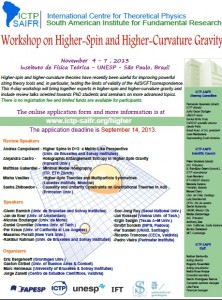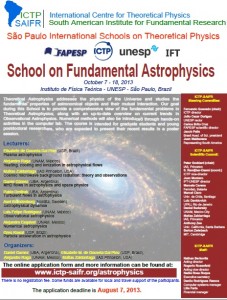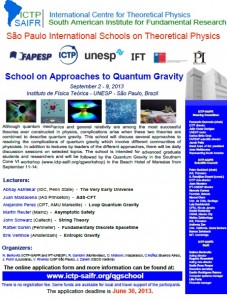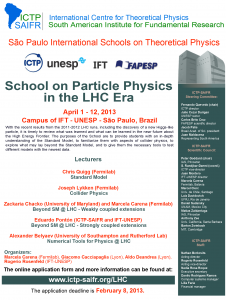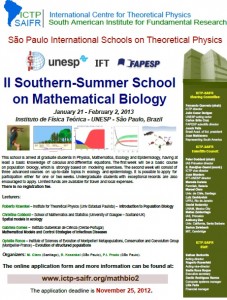Search Results
String theory
In the field of string theory, there are active groups both at IFT-UNESP and USP Sao Paulo and informal seminars are organized weekly at both institutions.
Permanent researchers include
Nathan Berkovits (IFT-UNESP)
Andrei Mikhailov (IFT-UNESP)
Horatiu Nastase (IFT-UNESP)
Victor Rivelles (USP Sao Paulo)
Diego Trancanelli (USP Sao Paulo)
Current research topics include covariant quantization of the superstring, the pure spinor formalism, AdS-CFT, integrability, higher-spin theories, AdS-CMT, noncommutative geometry, twistors, matrix models, super-Yang-Mills, and supergravity.
Continue Reading | Comments Off on String theory
Research Areas
Research at the ICTP-SAIFR includes collaborations with scientists based at IFT-UNESP as well as at other São Paulo institutions such as USP São Paulo, Unicamp, UFABC, UNESP Rio Claro, UNESP Guaratinguetá, USP São Carlos, UFSCar, ITA and INPE.
Current active research areas include:
Atomic and few-body physics
Complex systems
Condensed matter theory
Cosmology
Experimental high-energy physics
General relativity
Gravitational wave physics
Mathematical physics
Particle physics
QCD and hadronic physics
String theory
Continue Reading | Comments Off on Research Areas
Joseph Minahan minicourse on integrability
Minicourse:
Integrability in N=4 super-Yang-Mills
Speaker:
Joseph Minahan (Uppsala University and MIT)
Schedule:
Monday, September 3, 14:00-16:00, Lecture 1 (video 1, video 2)
Tuesday, September 4, 9:00-11:00, Lecture 2 (video 1, video 2)
Tuesday, September 4, 12:00-14:00, Lecture 3 (video 1, video 2)
Continue Reading | Comments Off on Joseph Minahan minicourse on integrability
History
The SILAFAE (Simposio Latinoamericano de Física de Altas Energías) is now firmly established as being one of the premier series of international meetings in the field of Particle Physics. One of the main purposes of the Meeting is to foster the exchange of ideas, promote collaborations and exchanges among Latin-american physicists as well as to present the status of the recent advances in frontier topics in the field.
The previous SILAFAE meetings were held in Valparaiso, Chile (2010); Bariloche, Argentina (2009); Merida, Mexico (1996); San Juan de Puerto Rico (1998), Cartagena, Colombia (2000); Aguas de Lindoia, Brazil (2002); Lima, Peru (2004); Puerto Vallarta, Mexico (2006).
Chile: http://www.fis.utfsm.cl/silafae2010/
Argentina: http://particulas.cnea.gov.ar/workshops/silafae/
Colombia: http://www.lnf.infn.it/conference/lnfss/Silafae-III/
Continue Reading | Comments Off on History
Hotel Recommendations
Paulista Wall Street
Rua Itapeva, 636 – 01332-000 São Paulo
Rates: R$ 253 + 5% (single) or R$ 283 + 5% (double)
They have made the above rate special for an event organized by UNESP. In order to get this rate you have to make your reservation by calling to +55 (11) 3141-3000, extension number 8422, and you have to mention that you will participate in an event organized by UNESP.
Holiday Inn Express
Rua Doutor Homem De Melo, 1206, Perdizes – 05007-002 SÃO PAULO BRAZIL
Rate: R$220,00 + 5% per room (single), or R$260,00+5% (double)
They have made the above rate special for an event organized by UNESP.
In order to get this rate you have to make your reservation before September 14, by calling to +55 (11) 3674-7777 or send an email to recepcao@holidayexsp.com.br. You have to mention that you will participate in an event organized by UNESP.
Formule 1 Paulista
Rua da Consolação 2303 – Consolação – 01301100 SÃO PAULO BRAZIL
Rate: R$170,00 per room (single, double or triple)
Good rate, very well located and close to many amenities.
Click here to make your reservation. In case you do not get availability, please send an email to secretary@ictp-saifr.org .
After you have made your reservation, please send an email to secretary@ictp-saifr.org, informing the hotel where you will stay.
Continue Reading | Comments Off on Hotel Recommendations
Workshop on Higher-Spin and Higher-Curvature Gravity
Start time: November 4
Ends on: November 7
Venue: São Paulo, Brazil
Organizers:
Eric Bergshoeff (Groningen Univ.) e-mail: e.a.bergshoeff@rug.nl
Gaston Giribet (Univ. of Buenos Aires & Conicet) e-mail: Gaston@df.uba.ar
Marc Henneaux (University of Bruxelles & Solvay Institutes) e-mail: henneaux@ulb.ac.be
Jorge Zanelli (Centro de Estudios Científicos, Valdivia) e-mail: z@cecs.cl
Review Speakers:
Andrea Campoleoni (Univ. de Bruxelles and Solvay Institutes), “Higher spins in D=3: a metric-like perspective”
Alejandra Castro (Harvard Univ.), “Holographic entanglement entropy in higher spin gravity”
Matthias Gaberdiel (ITP, ETH Zürich), “Minimal model holography”
Misha Vasiliev (Lebedev Institute, Moscow), “Higher spin theories and multiparticle symmetries”
Sasha Zhiboedov (Princeton Univ.), “Causality and unitarity constraints on gravitational theories in AdS”
Confirmed Speakers:
Max Banados (Univ. Catolica, Santiago), “Building black holes with higher spin”
Glenn Barnich (Univ. de Bruxelles and Solvay Institutes), “Holographic current algebras and BMS4”
Nicolas Boulanger (Univ. de Mons), “A higher-spin Chern-Simons model with fractional-spin fields”
Daniel Grumiller (Vienna Univ. of Tech.), “Holography and phase transition of flat space”
Juan Jottar (Univ. of Amsterdam), “Entanglement entropy in three-dimensional higher spin theories”
Carlos Mafra (Cambridge Univ.), “The superstring 3-loop amplitude”
Massimo Porrati (New York Univ.), “On a canonical quantization of pure AdS_3 gravity”
Rakibur Rahman (Univ. de Bruxelles and Solvay Institutes), “Gravitational Interactions of Higher-Spin Fermions”
Soo-Jong Rey (Seoul National Univ.), “Tensionless String in N*=2 SUSY Gauge Theory”
Jan Rosseel (Vienna Univ. of Tech.), “Three-dimensional flat space higher-spin theory”
Ergin Sezgin (Texas A+M Univ.), “Critical Prokushkin-Vasiliev Theory and Topologically Massive Higher Spins”
Dmitri Sorokin (INFN, Padova), “Higher Spins in Hyperspace”
Per Sundell (UNAB, Santiago), “Vasiliev’s equations, deformed oscillators and topological open strings”
Massimo Taronna (MPI, Potsdam), “Cubic-Interaction-Induced deformations of higher-spin symmetries”
Ricardo Troncoso (CECs, Valdivia), “Higher spin gravity in 3D: Asymptotic structure, black holes and thermodynamics”
Pedro Vieira (Perimeter Institute), “Tailoring Spin Operators and Integrability”
Announcement
-
Photos of School
-
Videos of School
School Program
November 4 |
November 5 |
||
| 10.30 – 11.30 | Coffee + Registration | 10.30 – 12.00 | Alejandra Castro |
| 11.30 – 13.00 | Misha Vasiliev | 12.00 – 12.30 | Coffee Break |
| 13.00 – 15.30 | Lunch Break | 12.30 – 13.00 | Massimo Porrati |
| 15.30 – 16.00 | Glenn Barnich [File] | 13.00 – 15.30 | Lunch Break |
| 16.00 – 16.30 | Daniel Grumiller | 15.30 – 17.00 | Sasha Zhiboedov |
| 16.30 – 17.00 | Coffee Break | 17.00 – 17.30 | Coffee Break |
| 17.00 – 17.30 | Nicolas Boulanger | 17.30 – 18.00 | Rakibur Rahman |
| 17.30 – 18.00 | Juan Jottar | 18.00 – 18.30 | Dimitri Sorokin [File] |
November 6 |
November 7 |
||
| 10.30 – 12.00 | Matthias Gaberdiel | 10.30 – 12.00 | Andrea Campoleoni |
| 12.00 – 14.00 | Lunch Break | 12.00 – 12.30 | Coffee Break |
| 14.00 – 15.00 | Colloquium | 12.30 – 13.00 | Max Banados |
| 15.00 – 15.30 | Coffee Break | 13.00 – 14.30 | Lunch Break |
| 15.30 – 16.00 | Jan Rosseel | 14.30 – 15.00 | Ricardo Troncoso |
| 16.00 – 16.30 | Ergin Sezgin | 15.00 – 15.30 | Carlos Mafra |
| 16.30 – 17.00 | Coffee Break | 15.30 – 16.00 | Massimo Taronna |
| 17.00 – 17.30 | Per Sundell [File] | 16.00 – 16.30 | Farewell Coffee |
| 17.30 – 18.00 | Pedro Vieira | ||
| 18.00 – 18.30 | Soo-Jong Rey | ||
| 19.30 | Conference dinner | ||
Continue Reading | Comments Off on Workshop on Higher-Spin and Higher-Curvature Gravity
School on Fundamental Astrophysics
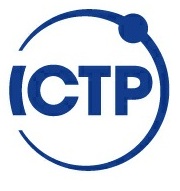 |
 |
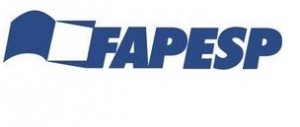 |
Theoretical Astrophysics addresses the physics of the Universe and studies the fundamental properties of astronomical objects and their mutual interaction. Our goal during this School is to provide a comprehensive view of the fundamental problems in Theoretical Astrophysics, along with an up-to-date overview on current trends on Observational Astrophysics. Numerical methods will also be introduced through hands-on activities in the computer lab. The course is intended for graduate students and young postdoctoral researchers, who are expected to present their recent results in a poster session.
Start time: October 7
Ends on: October 18
Venue: São Paulo, Brazil
Organizers: Daniel Gomez (UBA, Argentina), Elisabete M. de Gouveia Dal Pino (USP, Brasil), Alejandro Raga (UNAM, Mexico), Matias Zaldarriaga (IAS Princeton, USA)
Lecturers:
Elisabete de Gouveia Dal Pino (USP, Brazil) – Plasma astrophysics
Alejandro Raga (UNAM, México) – Heating, cooling and ionization in astrophysical flows
Matías Zaldarriaga (IAS Princeton, USA) – Cosmic microwave background radiation: theory and observations
Daniel Gómez (UBA, Argentina) – MHD flows in astrophysics and space physics
Pablo Dmitruk (UBA, Argentina) – Turbulent flows in astrophysics
Axel Brandenburg (Nordita, Sweden) – Astrophysical dynamos
Luis Felipe Rodriguez (UNAM, México) – Observational astrophysics
Alejandro Esquivel (UNAM, México) – Numerical astrophysics
Grzegorz Kowal (USP, Brazil) – Particle acceleration in astrophysics
Application Deadline, August 7
List of Participants: Updated on Oct 3
General Information: General Information Sheet
Poster Presentation: Participants who are presenting poster MUST BRING THE POSTER PRINTED. The poster size should be at most 1m x 1m.
Accommodation: Most participants whose accommodation has been arranged and paid by the institute will stay at Pousada Zilah. Each participant whose accommodation has been arranged by the institute has received the details about the accommodation individually.
Registration: We ask ALL PARTICIPANTS to arrive at IFT-UNESP (Rua Dr. Bento Teobaldo Ferraz, 271 Bloco 2 4th floor, in front of Terminal Barra-Funda) on Oct 7 between 8:00 am –9:00 am in order to complete the registration form and to collect the school material. You can find arrival instructions at http://www.ictp-saifr.org/?page_id=195.
Upon registration, participants who are receiving financial support, please bring a photocopy of your ID or passport.
BOARDING PASS – All participants, whose travel has been provided or will be reimbursed by the institute, should bring the boarding pass upon registration, and collect an envelope to send the return boarding pass to the institute.
Emergency number: 982 338 671 (from São Paulo city); +55 11 982 338 671 (from abroad), 11 982 338 671 (from outside São Paulo).
Ground transportation instructions:
From Pousada Zilah to the institute
From the airport to Pousada Zilah
Preliminary Programme: Updated on Oct 11
Files
- Raga1
- Rodriguez_1
- Rodriguez_2
- Rodriguez_3
- Rodriguez_4
- Zaldarriaga
- Brandenburg_1
- Brandenburg_2
- Brandenburg_3
- Brandenburg_4
- Dalpino_12
- Dalpino_3
- Dalpino_4
- Dmitruk_1
- Dmitruk_2
- Dmitruk_3
- Dmitruk_4
- Gomez_1
- Gomez_2
- Gomez_3
- Gomez_4
Student evaluations of school:
Photos:
|
First Week: October 7 – 11 |
|
|
Monday, October 7 |
|
|
8:00 – 9:00 |
Registration |
|
9:00 – 10:00 |
Opening |
|
10:00 – 10:30 |
Coffee break |
|
10:30 – 11:30 |
Rodriguez – Highlights in Multiwavelength astronomy [video] |
|
11:30 – 12:30 |
Raga – Heating, Cooling and Acceleration in Astrophysical Flows I [video] |
|
12:30 – 14:30 |
Lunch |
|
14:30 – 17:00 |
Numerics – Esquivel & Kowal |
|
Tuesday, October 8 |
|
|
9:00 – 10:00 |
Rodriguez – An Introduction to Radio Astronomy [video] |
|
10:00 – 10:30 |
Coffee break |
|
10:30 – 11:30 |
Raga – Heating, Cooling and Acceleration in Astrophysical Flows II [video] |
|
11:30 – 12:30 |
Raga – Heating, Cooling and Acceleration in Astrophysical Flows III [video] |
|
12:30 – 14:30 |
Lunch |
|
14:30 – 17:00 |
Numerics – Esquivel & Kowal |
|
|
|
|
Wednesday, October 9 |
|
|
9:00 – 10:00 |
Rodriguez – Disks and Jets in Star Formation [video] |
|
10:00 – 10:30 |
Coffee break |
|
10:30 – 11:30 |
Zaldarriaga – Cosmology I [video] |
|
11:30 – 12:30 |
Zaldarriaga – Cosmology II [video] |
|
12:30 – 14:30 |
Lunch |
|
14:30 – 17:00 |
Numerics – Esquivel & Kowal |
|
|
|
|
Thursday, October 10 |
|
|
9:00 – 10:00 |
Rodriguez – Observing Sgr A*, the Supermassive Black Hole at the centre of our Galaxy [video] |
|
10:00 – 10:30 |
Coffee break |
|
10:30 – 11:30 |
Raga – Heating, Cooling and Acceleration in Astrophysical Flows IV [video] |
|
11:30 – 12:30 |
Zaldarriaga – Cosmology III [video] |
|
12:30 – 14:30 |
Lunch |
|
14:30 – 17:00 |
Numerics – Esquivel & Kowal |
|
|
|
|
Friday, October 11 |
|
|
9:00 – 10:00 |
Zaldarriaga – Cosmology IV [video] |
|
10:00 – 10:30 |
Coffee break |
|
10:30 – 11:30 |
Dal Pino – Plasma Astrophysics I [video] |
|
11:30 – 12:30 |
Gomez – Fundamentals of MHD I [video] |
|
12:30 – 14:30 |
Lunch |
|
14:30 – 17:00 |
Posters |
|
Second Week : October – 14 or 18 |
|
|
Monday, October 14 |
|
|
9:00 – 10:00 |
Brandenburg – Waves, stratification, & helioseismology [video] |
|
10:00 – 10:30 |
Coffee break |
|
10:30 – 11:30 |
Dal Pino – Plasma Astrophysics II [video] |
|
11:30 – 12:30 |
Gomez – Fundamentals of MHD II [video] |
|
12:30 – 14:30 |
Lunch |
|
14:30 – 17:00 |
Discussion |
|
Tuesday, October 15 |
|
|
9:00 – 10:00 |
Brandenburg – Turbulence & computer simulations [video] |
|
10:00 – 10:30 |
Coffee break |
|
10:30 – 11:30 |
Gomez – Fundamentals of MHD III [video] |
|
11:30 – 12:30 |
Dmitruk – MHD turbulence in the solar wind I |
|
12:30 – 14:30 |
Lunch |
|
14:30 – 17:00 |
Discussion |
|
|
|
|
Wednesday, October 16 |
|
|
9:00 – 10:00 |
Dal Pino – Particle Acceleration I [video] |
|
10:00 – 10:30 |
Coffee break |
|
10:30 – 11:30 |
Dal Pino – Particle Acceleration II [video] |
|
11:30 – 12:30 |
Dmitruk – MHD turbulence in the solar wind II |
|
12:30 – 14:00 |
Lunch |
|
14:00 – 15:00 |
Colloquium |
|
15:00 – 17:00 |
Discussion |
|
|
|
|
Thursday, October 17 |
|
|
9:00 – 10:00 |
Brandenburg – Dynamos: helical & non-helical [video] |
|
10:00 – 10:30 |
Coffee break |
|
10:30 – 11:30 |
Gomez – Fundamentals of MHD IV [video] |
|
11:30 – 12:30 |
Dmitruk – MHD turbulence in the solar wind III [video] |
|
12:30 – 14:30 |
Lunch |
|
14:30 – 17:00 |
Discussion |
|
|
|
|
Friday, October 18 |
|
|
9:00 – 10:00 |
Brandenburg – MHD turbulence in stars, discs, & galaxies [video] |
|
10:00 – 10:30 |
Coffee break |
|
10:30 – 11:30 |
Dmitruk – MHD turbulence in the solar wind IV [video] |
|
11:30 – 12:30 |
Closing |
Continue Reading | Comments Off on School on Fundamental Astrophysics
School on Approaches to Quantum Gravity
 |
 |
 |
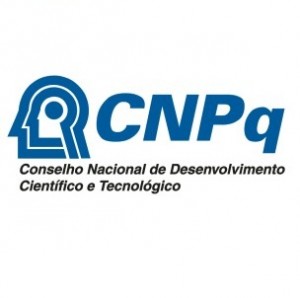 |
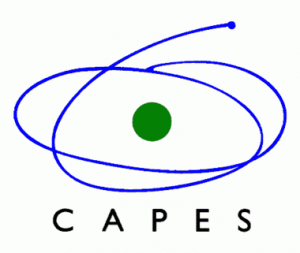 |
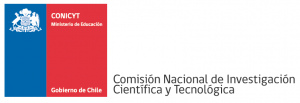 |
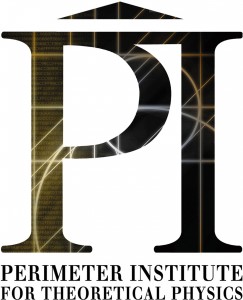 |
Although quantum mechanics and general relativity are among the most successful theories ever constructed in physics, complications arise when these two theories are combined to describe quantum gravity. This school will discuss several approaches to resolving the complications of quantum gravity which involve different communities of physicists. In addition to lectures by leaders of the different approaches, there will be daily discussion sessions on selected topics. The school is intended for advanced graduate students and researchers and will be followed by the Quantum Gravity in the Southern Cone VI workshop in the Beach Hotel of Maresias from September 11-14.
Start time: September 2
Ends on: September 9
Venue: São Paulo, Brazil
Organizers: Nathan Berkovits (ICTP-SAIFR and IFT-UNESP), Rodolfo Gambini (Montevideo), Olivera Miskovic (Valparaíso), Carmen Núñez (Buenos Aires), Jorge Pullin (Louisiana), Victor Rivelles (USP São Paulo), Jorge Zanelli (CECS Valdivia)
Lecturers:
Abhay Ashtekar (IGC, Penn State) – The Very Early Universe
Juan Maldacena (IAS Princeton) – AdS-CFT
Alejandro Perez (CPT, AMU Marseille) – Loop Quantum Gravity
Martin Reuter (Mainz) – Asymptotic Safety
John Schwarz (Caltech) – String Theory
Erik Verlinde (Amsterdam) – Entropic Gravity
L. Raul Abramo (USP Sao Paulo) – guest lecture on inflation
List of Participants: Updated on Aug 23
Accommodation: Most participants whose accommodation has been arranged and paid by the institute will stay at Pousada Zilah. Each participant whose accommodation has been arranged by the institute has received the details about the accommodation individually.
Participants whose accommodation has been arranged by the institute, but will pay for their own accommodation, will stay at Ibis-Budget Paulista. The information will be sent individually in a few days with the payment instruction.
Emergency number to call in case of any problem on the hotel check-in: 982 338 671 (from São Paulo city); +55 11 982 338 671 (from abroad), 11 982 338 671 (from outside São Paulo).
Registration: We ask ALL PARTICIPANTS to arrive at IFT-UNESP (Rua Dr. Bento Teobaldo Ferraz, 271 Bloco 2 4th floor, in front of Terminal Barra-Funda) on Sept. 2 between 8:00 am –9:00 am in order to complete the registration form and to collect the school material. You can find arrival instructions at http://www.ictp-saifr.org/?page_id=195.
Upon registration, please bring a copy of your ID or passport.
BOARDING PASS – All participants, whose travel has been provided or will be reimbursed by the institute, should bring the boarding pass upon registration, and collect an envelope to send the return boarding pass to the institute.
Ground transportation instructions:
From Pousada Zilah to the institute
From the airport to Pousada Zilah
Links to pdf files of speakers:
Abhay Ashtekar: bibliography, slides I, slides II, homework I, homework II, homework III
Martin Reuter: arXiv:0708.1317 and M.Niedermaier and M.Reuter, Living Rev. Relativity 9 (2006) 5-173, homework exercises I, homework exercises II
John Schwarz: notes on perturbative gravity, homework exercises, colloquium file
Alejandro Perez: homework exercises, slides, notes on black holes
Erik Verlinde: homework exercises
L. Raul Abramo: homework exercises
Juan Maldacena: homework I, homework II, homework III
Student evaluations of school:
Photos of school:
School Program: Print the PDF version
| September 2 to 9 | |
|
Monday, September 2 |
|
|
8:00 – 9:15 |
Registration |
|
9:15 – 10:30 |
Reuter – Lecture I [Video] |
|
10:30 – 10:45 |
Coffee break |
|
10:45 – 12:00 |
Perez – Lecture I [Video] |
|
12:00 – 13:00 |
Discussion |
|
13:00 – 14:45 |
Lunch |
|
14:45 – 16:00 |
Schwarz – Lecture I [Video] |
|
16:00 – 17:20 |
Homework session |
|
17:20 – 17:40 |
Coffee break |
|
17:40 – 19:00 |
Homework session |
|
Tuesday, September 3 |
|
|
9:15 – 10:30 |
Perez – Lecture II [Video] |
|
10:30 – 10:45 |
Coffee break |
|
10:45 – 12:00 |
Reuter – Lecture II [Video] |
|
12:00 – 13:00 |
Discussion |
|
13:00 – 14:45 |
Lunch |
|
14:45 – 16:00 |
Schwarz – Lecture II [Video] |
|
16:00 – 17:20 |
Homework session |
|
17:20 – 17:40 |
Coffee break |
|
17:40 – 19:00 |
Homework session |
|
|
|
|
Wednesday, September 4 |
|
|
9:15 – 10:30 |
Verlinde – Lecture I [Video] |
|
10:30 – 10:45 |
Coffee break |
|
10:45 – 12:00 |
Reuter – Lecture III [Video] |
|
12:00 – 14:00 |
Lunch |
|
14:00 – 15:00 |
Colloquium in IA Auditorium – Schwarz |
|
15:00 – 15:45 |
Coffee break |
|
15:45 – 16:45 |
Discussion |
|
16:45 – 19:00 |
Homework session |
|
|
|
|
Thursday, September 5 |
|
|
9:15 – 10:30 |
Perez – Lecture III [Video] |
|
10:30 – 10:45 |
Coffee break |
|
10:45 – 12:00 |
Schwarz – Lecture III [Video] |
|
12:00 – 13:00 |
Discussion |
|
13:00 – 15:00 |
Lunch |
|
15:00 – 16:15 |
Verlinde – Lecture II [Video] |
|
16:15 – 16:30 |
Coffee break |
|
16:30 – 19:00 |
Homework session |
|
|
|
|
Friday, September 6 |
|
|
9:15 – 10:30 |
Verlinde – Lecture III [Video] |
|
10:30 – 10:45 |
Coffee break |
|
10:45 – 12:00 |
Abramo – Lecture on Inflation [Video] |
|
12:00 – 13:00 |
Discussion |
|
13:00 – 14:45 |
Lunch |
|
14:45 – 16:00 |
Ashtekar – Lecture I [Video] |
|
16:00 – 16:15 |
Coffee break |
|
16:15 – 19:00 |
Homework session |
|
Saturday, September 7 |
|
|
9:15 – 10:30 |
Ashtekar – Lecture II [Video] |
|
10:30 – 10:45 |
Coffee break |
|
10:45 – 12:00 |
Verlinde – Lecture IV [Video] |
|
12:00 – 13:00 |
Discussion |
|
13:00 – 14:45 |
Lunch |
|
14:45 – 16:00 |
|
|
16:00 – 16:15 |
Coffee break |
|
16:15 – 19:00 |
Homework session |
|
Sunday, September 8 |
|
|
9:15 – 10:30 |
Maldacena – Lecture II [Video] |
|
10:30 – 10:45 |
Coffee break |
|
10:45 – 12:00 |
Ashtekar – Lecture III [Video] |
|
12:00 – 13:00 |
Discussion [Video] |
|
13:00 – 14:45 |
Lunch |
|
14:45 – 16:00 |
Maldacena – Lecture III [Video] |
|
16:00 – 16:15 |
Coffee break |
|
16:15 – 19:00 |
Homework session |
|
Monday, September 9 |
|
|
9:15 – 11:15 |
|
|
11:15 – 11:30 |
Coffee break |
|
11:30 – 13:00 |
|
|
13:00 – 15:00 |
Lunch |
|
15:00 – 16:15 |
|
|
16:15 – 16:30 |
Coffee break |
|
16:30 – 19:00 |
Homework session |
Continue Reading | Comments Off on School on Approaches to Quantum Gravity
School on Particle Physics in the LHC Era
With the recent results from the 2011-2012 LHC runs, including the discovery of a new Higgs-like particle, it is timely to review what was learned and what can be learned in the near future about the High Energy Frontier. The purposes of the School are to provide students with an in-depth understanding of the Standard Model, to familiarize them with aspects of collider physics, to explore what may lay beyond the Standard Model, and to give them the necessary tools to test different models with the newest data.
Start time: April 1
Ends on: April 12
Venue: São Paulo, Brazil
Organizers: Marcela Carena (Fermilab), Aldo Deandrea (Lyon), Ricardo D’Elia Matheus (IFT-UNESP), Rogerio Rosenfeld (ICTP-SAIFR and IFT-UNESP), Giacomo Cacciapaglia (Lyon)
Lecturers:
. Standard Model @ LHC – Chris Quigg (Fermilab)
. Collider Physics – Joe Lykken (Fermilab)
. QCD – Daniel de Florian (University of Buenos Aires)
. Beyond SM @ LHC (Weakly coupled extensions) – Zackaria Chacko (Maryland) and Marcela Carena (Fermilab)
. Beyond SM @ LHC (Strongly coupled extensions) – Eduardo Ponton (ICTP-SAIFR and IFT-UNESP)
. Numerical Tools for Physics @ LHC – Alexander Belyaev (Southampton)
Student evaluations of school:
– Photos
Projects and Exercises:
Daniel de Florian
– Project
Alexander Belyaev
– Project
– cern_school_project_belyaev.pdf
– cern_school_project_belyaev.odp
– Dropbox
Eduardo Ponton
– Project
– XDim-Lecture1.pdf
–XDim-Lecture2.pdf
Marcela Carena
– Exercises
– SUSY-ICTP-SAIFR-2013.pdf
Chris Quigg
– Quigg-1.pdf
– Quigg-2.pdf
– Quigg-3.pdf
– Quigg-4.pdf
– Quigg-5.pdf
◊ List of Participants: List of Participants_Updated on March 28
◊Accommodation: Participants whose accommodation has been arranged by the institute will stay at Blair House Flat
◊ Registration for participants who will stay at Blair House Flat: ALL participants should register. Participants who will stay at Blair House Flat can complete the registration procedure on March 31 from 5 to 7 pm. Participants who will stay at Blair House Flat but will arrive later, can register on April 1 at the institute. The registration at the institute will be on April 1 from 8am to 9am. Upon registration, please bring a copy of your ID or passport.
◊Participants who live in São Paulo or have accommodation arranged on their own: We ask you to kindly arrive at IFT-UNESP (Rua Dr. Bento Teobaldo Ferraz, 271 Bloco 2 4th floor, in front of Terminal Barra-Funda) on April 1 between 8 – 9:00am in order to complete the registration form and to collect the school’s material. Should you have any questions on how to reach the institute, please do not hesitate to contact us.
BOARDING PASS – All participants, whose travel has been provided by the institute, should bring the boarding pass upon registration, and collect an envelope to send the return boarding pass to the institute.
◊Ground transportation instruction:
From Guarulhos Airport to Blair House Flat
From Blair House Flat to the institute
◊Upon arrival information: General Information sheet
◊Programme: PDF Version_updated on April 10
School on Particle Physics in the LHC Era
Programme
Seminars on Saturday (April 06)
11:00 – 11:45
Parameterisations for Higgs physics beyond the standard model
Aldo Deandrea (Lyon)
11:45 – 12:30
Dark matter in a twisted bottle
Giacomo Cacciapaglia (Lyon)
Lectures:
Chris Quigg – Standard Model
Daniel de Florian – QCD
Joe Lykken – Collider Physics
Eduardo Pontón – Extra dimensions
Marcela Carena – Introduction to SUSY
Zackaria Chacko – Little Higgs, SUSY breaking
Sasha Belyaev – Numerical tools for the LHC
Continue Reading | Comments Off on School on Particle Physics in the LHC Era
II Southern-Summer School on Mathematical Biology
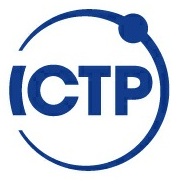 — |
Start time: January 21, 2013 Ends on: February 2, 2013Venue: São Paulo, BrazilOrganizers: M. Clerc (Santiago), R. Kraenkel (São Paulo), P.I. Prado (São Paulo) Lecturers:—
Lecture 1: Overview of approaches to large scale spatial ecology; introduction to metapopulations; spatial implicit and explicit models. Lecture 2: Individual movement and random walks; diffusion-advection equations; mean first passage time and critical patch size Lecture 3: Invasion; spatio-temporal synchrony; pattern formation. Lecture 4: Introduction to integrodifference equations; numerical solutions; applications. Cristina Banks-Leite and Ana I. Bento – Imperial College (London, UK) – –Advanced topics in population and community ecology and conservation: Description: This school is aimed at graduate students in Physics, Mathematics, Ecology and Epidemiology, having at least a basic knowledge of calculus and differential equations. The first week will be a basic course on population biology, which is strongly based on modeling exercises. The second week will consist of three advanced courses on up-to-date topics in ecology and epidemiology. It is possible to apply for participation either for one or two weeks. Undergraduate students with exceptional records are also encouraged to apply. Limited funds are available for travel and local expenses. There is no registration fee. Please notice that acceptance cannot be taken for granted, as we expect a much higher number of applications than the maximum number of participants. We advise the candidates to carefully complete the application form, providing enough information for the selection committee to take a decision. In order to have a full idea of the kind of activities that take place during the course, please visit the home-page of the first edition of this school at http//www.ictp-saifr.org/mathbio. Announcement◊ List of Participants: PDF Version_updated on Jan 14 ◊Accommodation: Participants whose accommodation has been arranged by the institute will stay at Pousada Zilah ◊ Registration: ALL participants should register. Participants who will stay at Pousada can do the registration procedure on Jan 20 from 5 to 8 pm. Participants who will stay at Pousada Zilah but will arrive later, can register on Jan 21 at the institute. The registration at the institute will be on Jan 21 from 8 to 9am and on Jan 28 from 1 to 2pm. Upon registration, please bring a copy of your ID or passport. BOARDING PASS – All participants, whose travel has been provided by the institute, should bring the boarding pass upon registration, and collect an envelope to send the return boarding pass to the institute. ◊Ground transportation instruction: From Guarulhos Airport to Pousada Zilah From Congonhas Airport to Pousada Zilah From Pousada Zilah to the institute ◊Upon arrival information: General Information sheet Material for classes:
1st week’s project presentations:
|
||||||||||||||||||||||||||||||||||||||||||||||||||||||||||||||||||||||||||||||||||||||||||||||||||||||||||||||||||||||||||||||||||||||||||||||||||||||||||||||||||||||||||||||||||||||||||||||
| FIRST WEEK: January 21 to 27 | |
| Monday, 21 January | |
| 8:00 – 9:00 | Registration |
| 9::00 – 11:30 | OPENING and LECTURE I Single species dynamics |
| 11:30 – 18:00 | WORK ON PROJECTS (lunch and coffee break will be available during this time) |
| 18:00 – 19:30 | PRESENTATION OF PROJECTS |
| Tuesday, 22 January | |
| 9:00 – 11:00 | LECTURE II Predation |
| 11:00 – 18:00 | WORK ON PROJECTS (lunch and coffee break will be available during this time) |
| 18:00 – 19:30 | EXTRA LECTURE Stability Analysis |
| Wednesday, 23 January | |
| 9:00 – 11:00 | LECTURE III Competition |
| 11:00 – 18:00 | WORK ON PROJECTS (lunch and coffee break will be available during this time) |
| Thursday, 24 January | |
| 9:00 – 11:00 | LECTURE IV Epidemics |
| 11:00 – 18:00 | WORK ON PROJECTS (lunch and coffee break will be available during this time) |
| 18:00 – 19:30 | BESTIARIUM |
| Friday, 25 January | |
| 9:00 – 11:00 | LECTURE V Spatial ecology |
| 11:00 – 18:00 | WORK ON PROJECTS (lunch and coffee break will be available during this time) |
| Saturday, 26 January | |
| 9:00 – 11:00 | LECTURE VI Desertification and alternative States |
| 11:00 – 19:30 | WORK ON PROJECTS (lunch and coffee break will be available during this time) |
| Sunday, 27 January | |
| 9:00 – 12:00 | PROJECT PRESENTATION |
| 12:00 – 14:00 | Lunch |
| 14:00 – 18:00 | PROJECT PRESENTATION |
| SECOND WEEK: January 28 to February 2 | |
| Monday, 28 January | |
| MORNING | FREE |
| 13:00: – 14:00 | Registration for second week-only participants |
| 14:00 – 15:30 | COBBOLD |
| 15:30 – 16:00 | Coffee break |
| 16:00 – 17:00 | DISCUSSION |
| 17:00 – | Free |
| Tuesday, 29 January | |
| 9:00 – 10:30 | BANKS-LEITE/BENTO |
| 10:30 – 11:00 | Coffee break |
| 11:00 – 12:00 | DISCUSSION |
| 12:00 – 14:00 | Lunch |
| 14:00 – 15:30 | COBBOLD |
| 15:30 – 16:00 | Coffee break |
| 16:00 – 17:00 | DISCUSSION |
| 17:00 – 18:00 | FREE |
| 18:00 – 19:30 | SEMINAR I – Glauco Machado – Ecology Departament USP |
| Wednesday, 30 January | |
| 9:00 – 10:30 | GOMES |
| 10:30 – 11:00 | Coffee break |
| 11:00 – 12:00 | DISCUSSION |
| 12:00 – 14:00 | Lunch |
| 14:00 – 15:30 | BANKS-LEITE/BENTO |
| 15:30- 16:00 | Coffee break |
| 16:00 – 17:00 | DISCUSSION |
| 17:00 – 18:00 | FREE |
| 18:00 – 19:30 | SEMINAR II – Hélène Morlon – École Polytechnique |
| Thursday, 31 January | |
| 9:00 – 10:30 | COBBOLD |
| 10:30 – 11:00 | Coffee break |
| 11:00 – 12:00 | DISCUSSION |
| 12:00 – 14:00 | Lunch |
| 14:00 – 15:30 | GOMES |
| 15:30- 16:00 | Coffee break |
| 16:00 – 17:00 | DISCUSSION |
| Friday, 1 February | |
| 9:00 – 10:30 | BANKS-LEITE/BENTO |
| 10:30 – 11:00 | Coffee break |
| 11:00 – 12:00 | DISCUSSION |
| 12:00 – 14:00 | Lunch |
| 14:00 – 15:30 | COBBOLD |
| 15:30 – 16:00 | Coffee break |
| 16:00 – 17:00 | DISCUSSION |
| 17:00 – 18:30 | GOMES |
| 18:30 – 19:30 | DISCUSSION |
| Saturday, 2 February | |
| 9:00 – 10:30 | GOMES |
| 10:30 –11:00 | Coffee break |
| 11:00 – 12:00 | DISCUSSION |
| 12:00 – 14:00 | Lunch |
| 14:00 – 15:30 | BANKS-LEITE/BENTO |
| 15:30 – 16:00 | Coffee break |
| 16:00 – 17:00 | DISCUSSION |
| 17:00 – 18:00 | CLOSING AND COCKTAIL |
Continue Reading | Comments Off on II Southern-Summer School on Mathematical Biology
